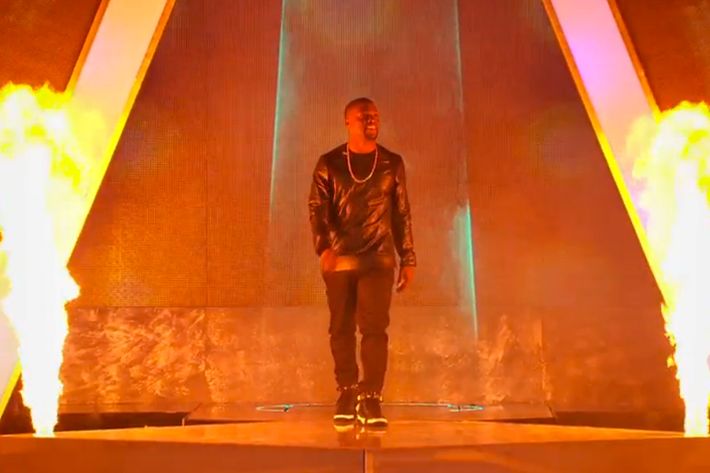
Near the start of Kevin Hart’s new comedy concert film, Let Me Explain, he moseys onstage in front of a sold-out Madison Square Garden crowd, surrounded by geysers of flames jetting out from the stage. As Hart explains, he wanted to have the same kind of over-the-top pyrotechnics like those he had seen at a Jay-Z/Kanye West concert. And he does. And its ridiculous. Throughout his performance in the film, these bursts of fire are used to punctuate punch lines or at random moments. It’s a silly little gag that nonetheless says a lot about Hart — that he’s a black comedian with a sense of showmanship who is also self-aware about not being as cool as rap stars. And it’s this dynamic that has helped make him arguably the biggest stand-up comedian working today, with a giant fan base that justifies the theatrical release of Let Me Explain at a time when the comedy concert movie is seen as a thing of the past. (These days, the standard route is straight to cable or, as in the case of Louis C.K. and Aziz Ansari, self-distributed online.) And whatever the format, with half of 2013 down, it looks like Let Me Explain might just be the year’s best stand-up special.

After years of near big breaks (a 2001 co-starring role in a failed Judd Apatow pilot, a 2004 sitcom that lasted only six episodes, a starring role in the film Soul Plane), Hart turned his attention to stand-up, slowly building an audience under the radar of the mainstream media. 2010’s Seriously Funny was that year’s highest rated stand-up special on Comedy Central. 2011’s independently released Laugh at My Pain grossed $7.7 million at the box office, making it the eighth highest grossing indie film of the year. His starring role in 2012’s hit comedy Think Like a Man solidified his position as one of the hottest comedians in Hollywood — he currently has about half a dozen film projects in the works, as well as a hit BET show, Real Husbands of Hollywood.
As Hart explained in Laugh at My Pain, his bad luck turned around when he started doing more personal material onstage, talking about his family — his father’s coke addiction, his marriage, his children — and taking himself down a peg. Hart’s best jokes contrast bravado and masculinity with insecurity and self-deprecation. In Laugh at My Pain, he tells a joke about how he might be doing well financially, but he’s nothing compared to his athlete friends: “Dwyane Wade tried to make me buy a boat. I don’t even have a fucking house.” In that way, the movie was a mission statement, establishing Hart’s brand of comedy, which has always contained elements from prior greats: Bill Cosby’s storytelling ability; Eddie Murphy’s charm, energy, and ability to play characters; Louis C.K.’s self-exploration; Chris Rock’s pointedness; George Carlin’s ability to build momentum; Dave Chappelle’s ease; Woody Allen’s height.
While Laugh at My Pain was brilliant in small spurts, Let Me Explain is even better, a performance by a comedian at the height of his powers (something the film wants us to remember, which is why its first fifteen minutes are taken up by a mini-documentary of Hart’s hugely successful international tour). Let Me Explain is Kevin Hart as Kevin Hart. He blends frantic silliness and honesty in a way that no one at his level is doing today. Hart’s 2011 divorce runs throughout the entire special. A bit about trying to save his marriage descends into talking about doing ecstasy for the first time and a pantomime of making sweet, sweet love to a beanbag chair. He goes from talking about wanting to be a better father to how he wouldn’t know what to do if he ever caught his ex-wife giving another man a blow job (he’s so short he might accidentally head-butt the guy right in his erection). There’s an axiom that says “truth in comedy,” and Hart’s insecurity around the end of his marriage and his own masculinity is where Let Me Explain’s comedy comes from.
Somewhere over the last 30 years or so, it became cool for comedians to develop an antagonistic relationship with their audience. “I’m going to destroy them tonight” is the type of thing that would be heard in comedy clubs across the country. Chris Rock is one of the greatest stand-ups ever, but when you watch him methodically and forcibly attack his jokes, it can feel like he wants to dominate the audience. There’s none of that in Hart, and Let Me Explain hits because it’s possible to feel not only a connection to his jokes, but to him as a person. In the movie’s most singular moment, Hart is in the middle of a bit (which is seen below) and then he stops and giggles a little at the scenario he’s painting. Then he chuckles. Finally he breaks into a full-on, folded-over, tearing-up laugh. For almost two minutes, the special stops completely while Hart laughs uncontrollably. These days, laughing at your own jokes and breaking is often called hack-y, but it’s hard, in that moment, for such an argument to feel anything but cynical. If something is funny, once in a while, you want the comedian to be there with you, dying in laughter.
I couldn’t help but think of two comedians: Patrice O’Neal and Pete Holmes. The two are as different as comedians can be, but both are known for being fully present onstage. O’Neal, who died in 2011, could do an hour where he just messed around with the audience. Holmes is known for a youthful wackiness and willingness to laugh at himself onstage. O’Neal was one of the greats from the nineties, an era of tough club comedians; Holmes is one of today’s lighter, improv- and alternative room-raised rising stars. Hart falls directly between the two. He’s a transition away from the hard comedian on to something more fun, which makes him the most exciting stand-up working. Louis C.K.’s last rightfullyacclaimed special, Oh My God, was very funny, but it hit familiar beats for him (masturbation, kids, his middle-aged decomposition). Hart’s goofy confessional style feels like something fresh.





